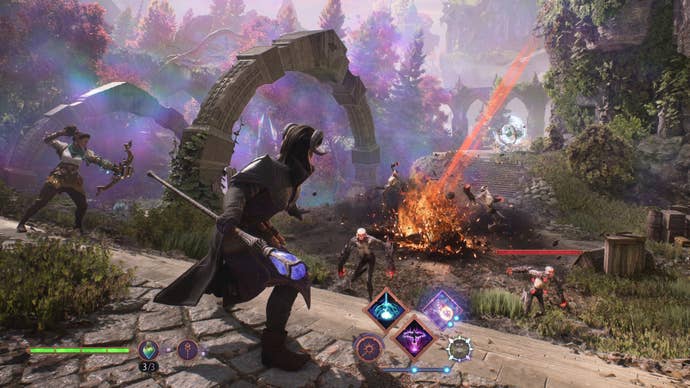Dragon Age: The Veilguard could be escaping Baldur's Gate 3's shadow by leaving its heritage behind
BioWare isn't trying to occupy the same fantasy RPG space anymore, and that's okay.
Dragon Age: The Veilguard (God, I really dislike that title change) is almost here, finally. After an early scare because of a slightly confusing first trailer, that gameplay demo quelled many of our worries, but can it really escape Baldur's Gate 3's shadow?
I'm of the striking opinion that it already has... kind of. It's hard not to think about Larian's near-flawless RPG whenever the new Dragon Age is brought up (in fact, I already linked the two last year), yet all the in-depth previews and the gameplay presentation released to the public suggest we're looking at an entirely different breed of RPG, one that's doing its own thing.
In our own hands-on preview of the game, Alex already teased that "Dragon Age: The Veilguard is going to be a lot of things to a lot of people." And I think that's sums up the unorthodox series as a whole quite nicely. Anyone who claims Dragon Age hasn't evolved (or devolved) with each new entry is either lying or urgently needs to revisit not only Inquisition, but also Dragon Age 2 and Origins.
The series' need for reinvention hasn't always been tied to a pure creative push, and DA2's maddening dev cycle and the end result (which was mostly enjoyable despite everything) are the solid proof of how shaky its growth process has been since the very beginning. Running along the far more straightforward Mass Effect trilogy, Dragon Age's unstable DNA only became harder to deny.

I've already rambled plenty in the past about Baldur's Gate 3 (and also the more recent Divinity games) taking over much of the fantasy RPG space that Dragon Age used to govern, at least in the big-budget leagues. A key difference has always been that Larian stuck closer to CRPG tradition while Dragon Age, even during its humble beginnings, pursued a more approachable set of systems and moment-to-moment gameplay largely inherited from older BioWare games like Star Wars: Knights of the Old Republic.
There's a common spiritual thread connecting BioWare and Larian's output, and that goes beyond the shared Baldur's Gate and Dungeons & Dragons ground, yet the former's output has been charting new paths for itself for more than a decade now. We could attribute much of the new elements and combat system iteration seen in the just-released gameplay of The Veilguard to Mass Effect's pre-Andromeda success; an attempt to make the most of a now-firmly established lineage of ARPGs. However, The Veilguard also appears to stand on its own as far more than 'Mass Effect but classic fantasy' or an action-heavy riff on its predecessors.

So far, and without having played The Veilguard myself, it looks like we could be going through a new type of BioWare RPG by the end of 2024. Those unfamiliar with the Dragon Age series that have enjoyed Baldur's Gate 3 could make the fourth entry their next 'fantasy dating sim' pit stop before discovering the three previous games. On the other hand, longtime BioWare followers will either recover lost faith or double down on the idea the company is too far gone and doesn't resemble the early 2010s version of itself anymore.
Personally, I was taken aback by The Veilguard's reveal, and the gameplay demo hasn't stunned me, yet the devs are saying the right things in the interviews and Q&As released afterwards, and I'm starting to think they might have made the correct late follow-up to Dragon Age: Inquisition, just not the one many of us were expecting.

